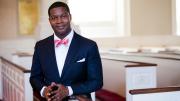President Drew Faust today announced the appointment of Harvard Divinity School faculty member Jonathan L. Walton as Pusey minister in the Memorial Church and Plummer professor of Christian morals, effective July 1. He succeeds the late Peter J. Gomes, who died in 2011. The Reverend Wendel W. Meyer has been acting Pusey minister.
Walton joined the faculty in mid 2010; he had been assistant professor of religious studies at the University of California, Riverside. A political-science graduate of Morehouse College, he earned a master of divinity degree and a Ph.D. in religion and society from Princeton Theological Seminary. A social ethicist and African-American religious studies scholar, according to his website, he focuses his scholarly work on the intersections of religions, politics, and media culture; he is the author of Watch This! The Ethics and Aesthetics of Black Televangelism.
According to the University news release, Walton is an ordained Baptist minister. He is a resident scholar in Lowell House , where he lives with his wife, Cecily Cline, and twins Elijah Mays and Zora Neale. (Lowell’s master is Diana Eck, Wertham professor of law and psychiatry in society, a scholar of comparative religion, and the co-master is Dorothy Austin, Sedgwick associate minister in the Memorial Church and University chaplain.)
In the announcement, Faust said:
I am delighted that Jonathan Walton will bring his remarkable talents to Memorial Church. He is among the country’s foremost scholars of African-American religion, a powerful preacher, a thoughtful pastoral presence, and a wonderful human being. His scholarly and ecclesiastical callings are mutually enriching in the best traditions of campus ministry. Professor Walton will bring new life to spirituality and religion at Harvard—as intellectual pursuit and lived experience.
Of the search that resulted in Walton’s selection, she said:
It is increasingly rare to find university churches that have remained vibrant communities of religious practice. From the outset, I wanted to maintain this distinctive Harvard institution, while also celebrating the enormously diverse religious and spiritual life of this campus.
The statement quoted Walton:
Sitting in the pews of Memorial Church, I have felt the special power of this place. To be considered for this position was an honor; to be selected is both exciting and humbling. I will do my utmost to continue the Church’s tradition of intellectually challenging and spiritually nourishing preaching, its outreach to students of all faiths, and its impact well beyond Harvard Yard.…For so many of us, college is a time of spiritual discovery. Especially at a place like Harvard, the fundamental questions—what our lives are for, what we owe others, how to live morally—are so important and so pressing. It’s been a joy to help students wrestle with these issues.









